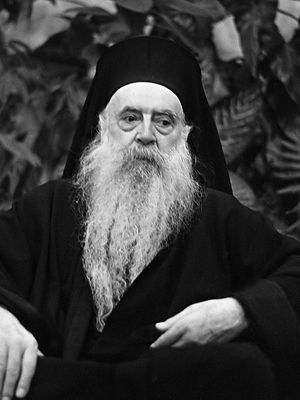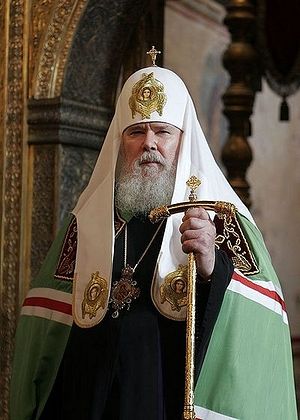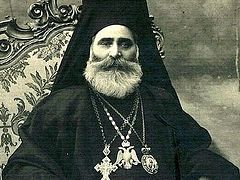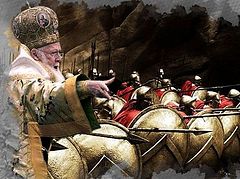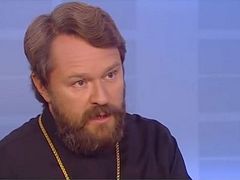1948 was a pivotal year for the Orthodox world. It was the year when the Orthodox church was thrust into the Cold War between America, the Soviet Union and their respective allies. That year witnessed the failure of Stalin's plan to move the leadership of the Orthodox world to the Soviet Union and establish an "Orthodox Vatican" in Moscow, after the decisions of the Orthodox conference held in Moscow in 1948 roused the free world vigilance in confronting the Soviet Union's plan to use the Russian Orthodox Church to promote Soviet policy and spread Communist thought in the Orthodox world. Political leaders in the West began taking practical steps to contain and confront Soviet expansion in the free Orthodox world. These steps began with pushing the Ecumenical Patriarch Maximos to resign. In his place Metropolitan Athenagoras of America, who was close to the American President Truman, was elected Ecumenical Patriarch. This was possible because the American, Greek and Turkish governments agreed on the election as part of a comprehensive plan to distance the latter two countries from the Soviet sphere, resulting in their joining NATO in 1951. Athenagoras arrived in Turkey in the American presidential plane and immediately upon landing he was granted Turkish citizenship at the airport. Thus, the Orthodox conference in Moscow achieved the opposite result of what its organizers had intended, as it led to the rediscovery of the Ecumenical Patriarch by the Western world. From that time, the West worked to raise his profile and transform him into a weapon for containing and confronting Soviet expansion into Orthodox countries outside the Iron Curtain, especially in Greece and the Ancient Patriarchates.
On both sides of the Iron Curtain, Orthodoxy paradoxically benefited from the circumstances of the Cold War. The Church of Moscow, which in the 20s and 30s had been on the brink of total annihilation under Soviet persecution, was able to reassert its presence within most of its pre-Revolutionary canonical territories and to reconstitute its episcopal body, which had been reduced to only four bishops on the entire territory of the Soviet Union.
During this period this church was likewise able to hold a synod to elect a new patriarch after having been unable for two decades to elect a successor to the martyred Patriarch Tikhon. The church was also permitted to revive a number of monasteries and churches and a some bishops, priests, monastics and believers were released from prisons and gulags as evidence of religious freedom in the Soviet Union.
During this period, the Ecumenical Patriarchate was also able to regain its role in the Orthodox and Christian worlds, which had been sharply diminished following the Greece’s loss in its war with Turkey and the population exchange mandated by the Treaty of Lausanne, which removed almost all Orthodox Christians in Turkey (apart from those living in Istanbul) to Greece. The Ecumenical Patriarchate further lost its freedom of action and ecumenical character when the Greek negotiator accepted that the patriarch’s role be limited to providing pastoral care to the Greek community in Istanbul and its surroundings and that the patriarchs and bishops be required to have been residents of the city before 1920 and of Turkish nationality, in order to prevent moving its headquarters from Turkey to Greece, as desired by the Turkish negotiator. It also was confronted with a schismatic body called the "Turkish Orthodox Church" whose leader occupied its headquarters for a time and called for its transformation into a Turkish national church. This group was even able to threaten the stability of the patriarchate and to take ownership of some of its most important properties in Istanbul for several years. The Ecumenical Patriarchate was, however, able in the mid-40s to regain some of these properties, just as it was able to elicit a degree of recognition of its role outside the borders of the Turkish state.
Changing political circumstances did not allow the period of détente between Constantinople and Moscow to last, as the systematic pogroms against the Greek community in Istanbul on April 6-7, 1955 led to the destruction of the Ecumenical Patriarchate's infrastructure and to the emigration of most of its flock. It is said that this led Patriarch Athenagoras to opine that the real fall of Constantinople occurred after these events. Throughout this time, Russian Church continued to suffer the horrors of systematic persecution and discrimination against believers.
Breaks in relations between Constantinople and Moscow and Turkey and the Soviet union, respectively, gave a positive impetus to the Orthodox world and all the churches were able to gather for the first time at a general conference held on the island of Rhodes in 1961. This meeting laid the foundations for arranging relations between the Orthodox churches and defined a shared mechanism for addressing controversial issues. This meeting resulted in an openness on the part of the Orthodox Church to dialogue and joint ecumenical work with the rest of the Christian world. It also inaugurated cooperation between the various local churches to find common solutions to issues that had arisen in the Orthodox world between the wars-- the most important of which were the issues of autocephaly and autonomy and organizing the Orthodox presence in the diaspora.
The Cold War left its mark on relations between the churches during this period, but they cooperated with each other, aware that each needed to adapt to the realities of its context. Political leaders also encouraged these meetings because they were an opportunity for each side to catch a glimpse of what was happening on the other side of the Iron Curtain, not to mention that it opportunities for propaganda and influencing the course of events on the other side.
Perhaps one could say that Orthodox activity attained its apex and made its more important achievements during the period of the Cold War. This period saw the Church of Moscow abandon its plan to lead the Orthodox world and accept the leadership role of the Ecumenical Patriarchate as first in honor among the patriarchates and churches. It likewise witnessed the start of preparatory work for the Great Orthodox Council, which entailed a great number of meetings where agreement was reached on the majority of items on its agenda. Three issues remained outstanding: the manner of signing a tomos of autocephaly, the conditions for granting autonomy and the issue of the diptychs. Joint Orthodox work, within the limited margins of freedom available at that time, relied on the fundamental premise of the acceptance by all the local churches of the existing boundaries of the local Orthodox churches, including the Church of Finland, which had separated from the Patriarchate of Moscow in the mid-50s and obtained autonomy from the Ecumenical Patriarchate. This work likewise followed the principle of building consensus between the churches and until unanimity could be reached on all the topics.
The end of the Cold War coincided with the election of Ecumenical Patriarch Bartholomew, who was elected without interference from the Turkish authorities, and the election of Patriarch of Moscow Alexei II by a synod that included all the metropolitans of the Russian Church and representatives from the clergy and laity. The post-Cold War period brought promises of overcoming the difficulties of the past and increased cooperation between the Orthodox churches, especially after the meeting of the first synaxis of the primates of the Orthodox churches at the Fanar, presided by Ecumenical Patriarch Bartholomew in 1992.
These promises were quickly dashed after Ecumenical Patriarchate decided unilaterally to grant autonomy to the Church of Estonia, which had been dependent on the Patriarchate of Moscow before the Bolshevik Revolution. This step worried Moscow, whose patriarch at the time had previously been Metropolitan of Estonia, as it understood this decision and the course of discussions with Constantinople to indicate a desire on the part of the Ecumenical Patriarchate to change the existing boundaries of the Orthodox churches and to encourage the establishment of national churches within the canonical boundaries of the Patriarchate of Moscow. This step likewise alerted the patriarchs of the other Orthodox churches to a transformation in the Ecumenical Patriarchate's understanding and practice of primacy.
The issue of Estonia led to a break in communion between the Ecumenical Patriarchate and the Patriarchate of Moscow for a number of months in 1996 and to the suspension of joint Orthodox activity for a decade. At the synaxis of the primates of the Orthodox churches in 2008, it was agreed that autonomous churches would be excluded from joint Orthodox activity and that the preparatory work for the Great Orthodox Council would recommence and complete the study of the three outstanding issues on its agenda. In practice, however, agreement was reached on the issue of autonomy and how it is to be granted, while agreement about the issues of the diptychs and the manner of ratifying a tomos of autocephaly was impossible. These two topics were excluded from the agenda of the Great Orthodox Council which, it was decided at the synaxis held in April of 2014, would be held on the Feast of Pentecost, 2016.
There did not appear during this preparatory work, and especially not in the study of the question of autocephaly, any positions implying a refusal to recognize the canonical boundaries of the autocephalous churches or a desire to revise these boundaries. His Holiness the Ecumenical Patriarch repeatedly affirmed that the Ecumenical Patriarchate recognizes the Ukrainian Church dependent on the Church of Moscow as the legitimate church in Ukraine. Its head took part in the synaxis of the primates of the churches that was held in Chambésy, Switzerland in January, 2016 as part of the delegation of the Church of Moscow, where His Holiness the Ecumenical Patriarch welcomed his presence.
The request of the churches of Antioch, Russia, Georgia and Bulgaria to postpone the Great Council, followed by their declining to participate in what became the "Council of Crete" in June, 2016, opened a new cold war in the Orthodox world. The Ecumenical Patriarchate and the Church of Greece responded by boycotting the celebrations of the centenary of the reestablishment of the Patriarchate of Moscow held in early December, 2017. The issue of Ukraine was re-opened a quarter-century after the schism of Metropolitan Filaret and his declaring the establishment of the so-called Patriarchate of Kiev, which is not recognized by any of the Orthodox churches.
The rhetoric of the Ecumenical Patriarchate changed after the Council of Crete and it started to state in its literature that it is the mother church of the Church of Ukraine and that this church was uncanonically absorbed by the Church of Moscow in the 17th century. On this basis, the Ecumenical Patriarchate declared that it considers itself as having the competency to grant this church autocephaly. Some of its bishops even went so far as to reject the rules that were agreed upon during the joint Orthodox work on the issue of autocephaly and the manner of its declaration and to state that what was agreed upon by all the churches is not valid for dealing with the issues that have been raised to the conscience of the Church in the current century-- especially given the ambiguity that still prevails about their opinion about what is meant by "mother church" with regard to the church in Ukraine, for example. They likewise questioned the principle of requiring the unanimity of the Orthodox churches, regarding it as too difficult to achieve, as demonstrated by experience during discussion of the document on granting autocephaly during the preparatory work for the Great Council. In addition to the issue of Ukraine, the issue of the Macedonian schism has been raised within the Patriarchate of Serbia and it has been suggested that a solution must be found for the issues of the churches in Montenegro and Moldova. A communique issued by the Ecumenical Patriarchate has stated that the mother church of the churches in the Balkans remains the Ecumenical Patriarchate.
The Ecumenical Patriarchate’s statements have provoked a wave of anxiety in the Orthodox world and fears of schism. Several churches and bishops have expressed opinions that are not supportive of it. Senior officials in the Patriarchate of Moscow said that the day after the Ecumenical Patriarchate grants autocephaly to the Church of Ukraine could be likened to the day after the Great Schism between East and West. One of the bishops of the Serbian Patriarchate stated that any individual decision on the part of the Ecumenical Patriarchate regarding Serbia and Ukraine would be a grave mistake both canonically and spiritually and would be rejected by the universal Orthodox Church. He also stressed that the Orthodox churches regard the Ecumenical Patriarch as first among equals and not first without equal. On the other hand, a number of autocephalous Orthodox churches have kept silent and not taken any public position with regard to these developments, while other churches have expressed their support for the legitimate church in Ukraine dependent on Moscow. The Ukrainian and Macedonian crises have brought the Orthodox world into struggles that transcend ecclesiastical concerns and belong to the conflict between the West and Russia, just as Orthodoxy has embarked on internal conflicts, which observers fear, if allowed to worsen or if inappropriate steps are taken, will lead to schisms between and within the churches.
The Orthodox churches did not escape being influenced by political developments, since political leaders both inside and outside the Iron Curtain resorted to making use of the ancient rivalry between Second Rome and Third Rome over the course of the Cold War. At this difficult moment, when populism and nationalism are on the rise, borders are being redrawn, and a new order is slowly emerging out of the rubble of post-war arrangements designed to contain Soviet expansion, we must be vigilant against the exploitation of existing ecclesiastical disagreements for the sake of ephemeral political interests and nationalist projects. We must avoid the ethnic and political rivalries that have beset the Orthodox Church and fragmented it into national churches from the time of the Greek Revolution, which led to the Church of Greece declaring its autocephaly, an example that was followed as more countries gained their independence. The Orthodox churches must collectively address the notion that “every independent state has the right to an autocephalous church” and that “the borders of the church must change with changes in the political situation", not only because this idea subordinates the Church to political vicissitudes and fragments her into warring tribes, but also because it has never been the rule in the Orthodox world, since it is contrary to the nature of the Church.
The Ancient Patriarchates of the Orthodox Church have since ancient times transcended nations and ethnicities and they continue to do so. At the present, there are autocephalous churches whose territory only covers part of a state, as is the case for the Church of Greece. Other autocephalous churches extend over more than one state, as in the cases of the Church of Serbia and the Church of Czechia and Slovakia, which remained one church after being divided into different countries. We must also remember that the system of autonomy as an ecclesiastical arrangement does not mean the subordination of a church to another church or another state. It in no way detracts from the sovereignty of a state in which an autonomous church exists. The autonomy enjoyed by the Churches of Finland and Estonia within the Ecumenical Patriarchate has never been regarded as detracting from the sovereignty of those two states, just as the island of Crete’s autonomy within the Ecumenical Patriarchate has never been considered a violation of the sovereignty of the Greek state, despite the disagreements between Turkey and Greece. The ecclesiastical, canonical and even political situations of these churches differ little in principle from the situations of the autonomous Ukrainian Church dependent on the Patriarchate of Moscow and the Macedonian Church dependent on the Patriarchate of Serbia.
The Orthodox Church must pay heed to the dangers that result from feeding nationalist sentiments and tying the future of the Church to political considerations. The greatest responsibility in this regard lies with the Ecumenical Patriarchate. In order to fulfill its canonical role, it must put to use the primacy of service that it enjoys in order to assist the Churches of Russia and Serbia in healing the wounds caused to them by the Ukrainian and Macedonian schisms. This can only happen by recognizing the boundaries of the Orthodox churches that have been established for decades and following the principle that the Mother Church is the church whose Holy Synod includes the bishops who are requesting autocephaly.

